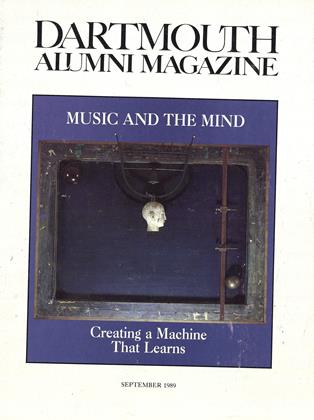When the Pittsburgh Pirates selected Mark Johnson '90 in the 30th round of the spring draft this year, few in the sports world paid much attention. In baseball parley, Johnson was a "hardsign" someone who has every reason to stay in college. Not only is Johnson bright, goodlooking and popular, at the time of the draft he was poised to begin a senior year that every male collegian dreams about. Last fall, after setting numerous passing records for the football team, Johnson was voted cocaptain and made a second-team All-Ivy quarterback. Because of his accomplishments on the mound, at the plate and on first base, Johnson was voted co-captain of next spring's Big Green nine and was a first-team All-Ivy utility man.
Pirates scout Rene Mons remarked that Johnson might have gone between the tenth and 15th rounds of the draft if he were not a talented Dartmouth senior. The Pirates were willing to gamble a draft pick to get him. Johnson, however, didn't think much of being a 30th-round draft pick. But that was before the Pirates came calling. And they called again and again. With every visit, the bonus offers rose. Johnson admitted to being "tempted." He cited the financial sacrifice his family made to send him to Dartmouth as an important factor. And while neither he nor Mons would reveal specific dollar amounts, Mons did confess to offering to pick up the remainder of Johnson's Dartmouth tuition, with a little on top of that. In other words, the offer appears to have been in the neighborhood of $20,000—nowhere near the $100,000-plus that Mike Remlinger '88 received as a first-round draft pick two years ago, but still a good deal more than a senior can earn working at Thayer.
In mid-July, Johnson said no to the Pirates. "I have such strong ties to Dartmouth that I just couldn't see leaving," he said. "I wanted to come back, play football and baseball and graduate with my class. I wanted to try to bring Dartmouth to the top again." Even so, the allure of Pirates' treasure left Johnson musing about what might have been. "I would've liked to have tried pro baseball and still have the chance to play football, but that's not possible," explained Johnson. NCAA rules allow for professional status in one sport and amateur in another, but Ivy League rules don't. An Ancient Eight student who signs any pro contract forfeits eligibility in all sports.
With Johnson's decision to stay, the biggest hurdle between the football team's success or failure in 1989 was cleared- "I've told Mark many times that I think his best football days are in front of him," said Coach Buddy Teevens '79. "He felt he owed it to himself and a lot of people to be here." In the wake of Johnson's decision, for the first time in six years several national magazines are picking Dartmouth to finish in the upper half of the Ivies.
A plus for Dartmouth is that Johnson will control a veteran offen- siveline and a backfield that features two returning starters (David Clark '90 and Brendan Mahoney '91) and welcomes back two athletically gifted players (Shon Page '90 and A1 Rosier '91) from personal leaves of absence. Optimists note that the offense needs only to develop a consistent cadre of wide receivers to be a dominant force in the league. The big unknown this season is defense. The entire lineback- ing corps and three of four defensive backs are gone. Teevens, however, isn't starting at ground zero. Many of the new starters on defense have seen substantial playing time.
while the rest hope to make the step up from bridesmaid to bride.
Men's soccer won its first Ivy crown since 1964 last fall with a combination of strong defense and sound offense. But Coach Bobby Clark admits that he would have breathed more easily (and that his team might have gotten an NCAA tournament bid) had they hit more of the shots they took. Last year, Dartmouth outshot its opponents 300-143 but the Big Green only outscored them 35-17.
Mary Twyman's field hockey team has racked up two consecutive Ivy titles. With two of her top three scorers back, she could well add a third. Like the football team, though, a young defense replaces last year's team MVPs, graduated backs Martha Boss 'B9 and Kim Koh '89.
The cross-country teams were the first teams in Dartmouth history to send men's and women's squads to an NCAA championship. The College was also the first scholarship-free school to enter men's and women's teams at the cross-country championships. Graduation took its toll on both squads, and while success is expected, Dartmouth might not be the dominant force it was in the recent past. 1 he Ivy-champion men's team will depend on new talent to win Ivy and national honors. Peter Fox Smith's women's squad boasts returning leaders Laurie Isbell '90 and Therese Devlin '90, and Fox believes that his team may even be able to upset Yale, last year's Ivy champs.
The women's soccer team finished second in the Ivies last year; only two starters were lost to graduation. Coach B.J. O'Hara believes the team has the talent, both on board and in the incoming freshman class, to contend for the title with perennial power Brown.
Mark Johnson's decision to forego Pittsburgh Pirates' treasure buoyed Coach Buddy Teevens' hopes.
 View Full Issue
View Full Issue
More From This Issue
-
 Cover Story
Cover StoryMUSIC AND THE MIND
September 1989 By Jay Heinrichs and Karen Endicott -
 Feature
FeatureA Cure for Nostalgia: the Ultimate Comp Exam
September 1989 By Nancy Staab '90 -
 Feature
FeatureSAILING FOR HOME
September 1989 By Heather Killebrew '89 -
 Feature
FeatureSon of Animal House
September 1989 By Ed. -
 Article
ArticleThe man who wrote the movie returns to find brothers in slime.
September 1989 By Chris Miller '63 -
 Article
ArticleDR WHEELOCK'S JOURNAL
September 1989








